It’s all Greek to me: The terms ‘praxis’ and ‘phronesis’ in environmental philosophy
Bill Dennison · | Applying Science | Learning Science | 3 commentsTwo of Peter Oliver’s favorite words were ‘praxis’ and ‘phronesis’. These Greek terms were part of the vocabulary of the ancient Greek philosophers and used by Aristotle to describe practical wisdom (phronesis) and thoughtful, practical doing (praxis). They were used within a broader vocabulary to describe various elements of learning and knowledge.
In my attempt to interpret and communicate the meaning of these Greek words and concepts, Peter and I collaborated on a series of conceptual symbols to denote a variety of Greek words which are described here.
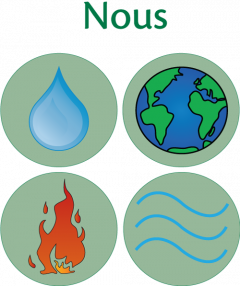
Nous means intellect or understanding and often interpreted as ‘good sense’. Aristotle considered the term nous to be a uniquely human quality. He thought that truth revealed the capacity of the soul and that the attainment of nous an important goal of an educated person. In Aristotle’s view, there was both ‘cosmic nous’ and ‘human nous’. Both Aristotle’s teacher Plato and Plato’s teacher Socrates used the term nous. The term nous appears in the Iliad when Agamemon is talking to Achilles, so Homer used the term as well. In order to depict nous, we used the four fundamental elements described by Aristotle: earth, water, fire and air/wind. Aristotle’s fifth element, aether, a divine substance which comprised the heavenly bodies, was not included.
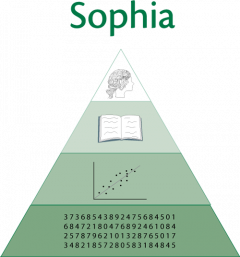
Sophia means wisdom, and Aristotle considered sophia to be theoretical wisdom. This could be interpreted in modern day terms as ‘book smart’, which does not necessarily mean ‘common sense’. Sophia needs to be coupled with nous to be both ‘book smart’ and having ‘common sense’. The word ‘philosophy’ is derived from sophia, and it can be translated in this way as the love (philo-) of wisdom (sophia). It is interesting that of the various Greek words, this is a word that people have chosen as a commonly used name for women. For the depiction of sophia, we chose a four level learning pyramid. The base of the pyramid is data (depicted as a number series), the second level is information (depicted as a graph), the third level is knowledge (depicted as a book) and the top layer is wisdom (depicted as a human head). We chose a woman’s head, given the feminine word sophia.

Techne means craftsmanship or art. The intent of the word techne is the making or doing as opposed to the understanding. It is the root of ‘technique’, ‘technical’ and various other derivatives. Aristotle viewed techne as an imperfect human representation of nature. Socrates and Plato also used the word, and distinguished craftsmanship (which they viewed in a positive light) from art (which they viewed in a negative light). The depiction of techne that we chose was the hands of a sculptor forming a bowl.
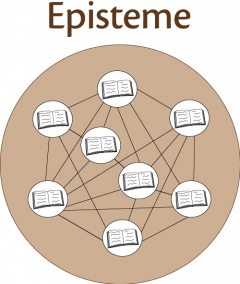
Episteme means knowledge or science. The verb form of this word translates ‘to know’. Epistemology, the study of knowledge, is derived from episteme. Episteme was viewed by the Greeks as a partner to techne. Plato used episteme to denote ‘justified true belief’. In modern terms, the word ‘paradigm’ popularized by Thomas Kuhn is often used in a manner similar to episteme was used by the Greeks. To depict episteme, we chose an interconnected network of books or knowledge to capture this concept of knowledge systems.
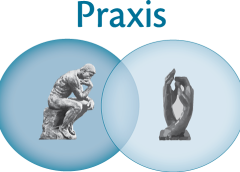
Praxis means thoughtful, practical doing. Aristotle, who loved to categorize various concepts, developed a three-tiered basic attributes of man scheme. This scheme describes 1) theoria or theoretical with the goal of truth, 2) poiesis or doing with the goal of production and 3) praxis or practical, thoughtful doing with the goal of action. The word praxis promotes both practice and reflection, seemingly paradoxical concepts. Combining these two elements is the genius of this word and why we find it so attractive. To depict praxis, we developed two overlapping circles, both containing iconic sculptures by the French sculptor, Auguste Rodin. The thoughtful component of praxis is depicted by Rodin’s famous ‘The Thinker” sculpture, and the practical doing component of praxis is depicted by Rodin’s famous “Two Hands” sculpture.
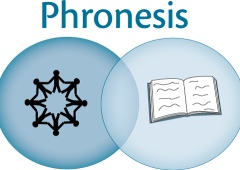
Phronesis means practical wisdom. Aristotle distinguished between sophia and phronesis in the following manner. Sophia involves reasoning concerning universal truths, while phronesis includes a capability of rational thinking. In order to practice phronesis, Aristotle felt that political abilities were required, as well as thinking abilities. Aristotle categorized there elements of character (ethos) in the following manner: 1) phronesis (how to act in particular situations), 2) arete (virtue) and 3) eunoia (goodwill). He also felt that phronesis was both necessary and sufficient for being virtuous. To depict phronesis, we developed two overlapping circles, not unlike the symbol for praxis. In the case of phronesis, the intersection of values (depicted as human figures holding hands in a circle) and knowledge (depicted as a book) are used.
While all of these Greek terms are ancient ways to describe the human condition and help describe the way that we interact with the world around us, they have relevance with important modern concepts. For example, ‘adaptive management’ is a popular term for “learning by doing”, not unlike what the Greek terms phronesis and praxis are promoting.
Developing a practical philosophy for environmental science
Science can be viewed as an attempt to develop nous (intellect) and sophia (wisdom), using the Greek terms promoted by Socrates, Plato and most importantly, Aristotle. These are classic attributes that we associate with science and learning. The way that Aristotle used the terms are akin the ‘common sense’ (nous) and ‘book smart’ (sophia) in modern vernacular. We can view these two terms as complementary skills needed by scientists. Since these terms are rather passive in that they do not involve any action, they can be seen as relatively theoretical and, in a sense, a historical perspective on what is needed for science.
The addition of techne (craftsmanship) and episteme (knowledge) to the repertory of a scientist provides an action-oriented aspect to science. Techne and episteme are also Greek words and were used as complementary terms just as nous and sophia were complementary terms. Modern science needs both sets of terms; nous and sophia combined with techne and episteme.
In Dancing with Dugongs, Peter Oliver and I promote two additional Greek terms for the scientific approach; praxis and phronesis. Praxis, defined as practical, thoughtful doing, combined with phronesis, practical wisdom where values intersect with knowledge describe what needs to happen in environmental science. We feel that these two terms are at the core of developing a practical philosophy for environmental science. It is simply not enough to know what should be done, or even recommend what should be done (e.g., science integration). Action is also required and this ‘doing’ in terms of environmental science can take the form of protection or restoration activities.
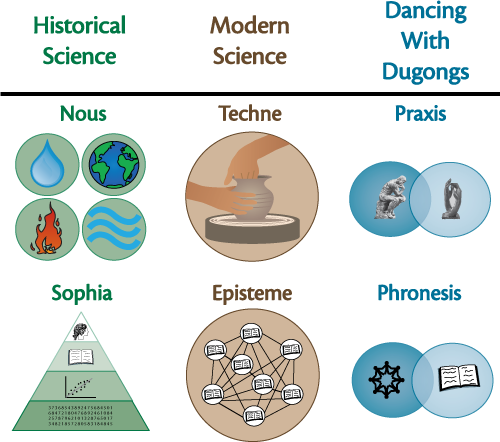
This blog post is an excerpt from Dancing with Dugongs: Having fun and developing a practical philosophy for environmental teaching and research by Peter E. Oliver and William C. Dennison, which will be released at the 2013 Riversymposium in Brisbane, Australia.
About the author
Bill Dennison

Dr. Bill Dennison is a Professor of Marine Science and Vice President for Science Application at the University of Maryland Center for Environmental Science.
Next Post > Healthy Waterways Healthy Catchments: Making the connection in South East Queensland, Australia
Comments
-
St. Joseph Mo Banquet Halls 11 years ago
Wonderful site. A lot of helpful info here. I am sending it to several pals ans also sharing in delicious.
And of course, thank you for your sweat! -
Mark 10 years ago
Great stuff!
-
True Science 8 years ago
In science the credit goes to the man who convinces the world, not to the man to whom the idea first occurs. Sir Francis Darwin